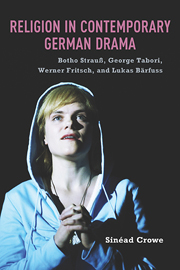 Religion in Contemporary German Drama
Religion in Contemporary German Drama Published online by Cambridge University Press: 05 May 2013
THE DEPARTURE POINT of this study was that religion did not “return” to German theater of the 2000s, as has been widely claimed. I identified several major works from the past four decades in which religion plays a prominent role. This role is complex and variegated, however. We have seen that a wide variety of dimensions of religion are invoked, including its beliefs, practices, myths, ethics, and experiential aspects, across various elements of theater, from its themes, forms, language, and characters to aspects of its mise en scène. Furthermore, religious elements serve a broad range of aesthetic, theatrical, and dramaturgical ends, some of which have little to do with religion itself.
If we are to identify one common thread linking the contemporary theatrical texts I have selected for analysis, though, it is this: they share the assumption that traditional religious forms are no longer able to cater for Western needs. The works of Botho Strauß, George Tabori, and Werner Fritsch all portray the Judeo-Christian God as a figure who is unfit for the modern world and unable to offer solutions for the existential, spiritual, or ethical crises experienced today. Strauß depicts God as a social misfit, and the basic position explored in certain of his plays from the 1970s to the present day is that postindustrial German society is a disenchanted place where religion survives, for the most part, only in a set of empty clichés: what Adorno, in reference to Beckett's Endgame, called “cultural trash.”
To save this book to your Kindle, first ensure [email protected] is added to your Approved Personal Document E-mail List under your Personal Document Settings on the Manage Your Content and Devices page of your Amazon account. Then enter the ‘name’ part of your Kindle email address below. Find out more about saving to your Kindle.
Note you can select to save to either the @free.kindle.com or @kindle.com variations. ‘@free.kindle.com’ emails are free but can only be saved to your device when it is connected to wi-fi. ‘@kindle.com’ emails can be delivered even when you are not connected to wi-fi, but note that service fees apply.
Find out more about the Kindle Personal Document Service.
To save content items to your account, please confirm that you agree to abide by our usage policies. If this is the first time you use this feature, you will be asked to authorise Cambridge Core to connect with your account. Find out more about saving content to Dropbox.
To save content items to your account, please confirm that you agree to abide by our usage policies. If this is the first time you use this feature, you will be asked to authorise Cambridge Core to connect with your account. Find out more about saving content to Google Drive.